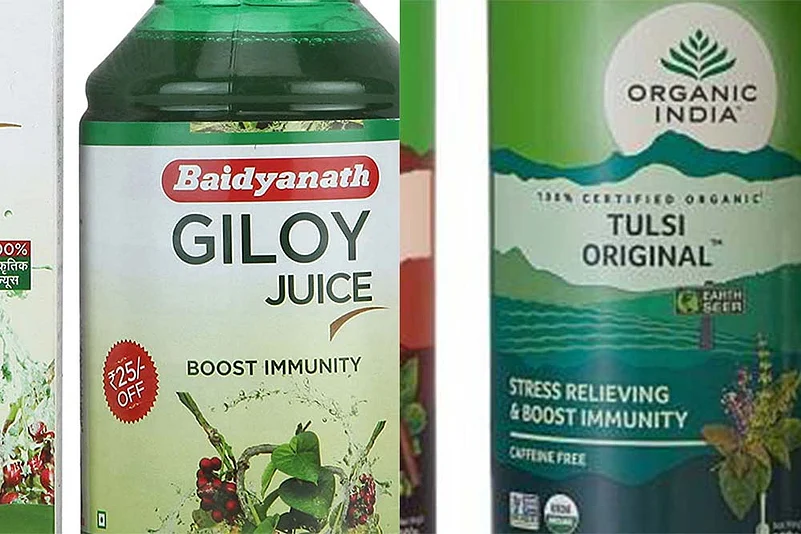The Battle of Haldighati played out every day in a Delhi household since the Covid plague barreled down on the country. The combatant mom pressed the entire might of her cavalry and archers to make the mutinous ten-year-old son drink her grandmother’s health recipe—a milkshake of freshly-ground pulpy turmeric, crushed clove and cardamom, and sugar to tranquilise the turmeric’s bitterness. But peace descended abruptly around late-June when milk fortified with haldi and in tasty flavours such as butterscotch became available in shops. Young Rohan Srivastava calls it “my golden milk” and demands a full glass before his online class.
Turmeric, the Indian kitchen’s inescapable condiment, is but another “super-food” from a wide range of immunity boosters that pandemic-scarred people have rediscovered. Without a vaccine or medicine, people have every reason to strengthen their immunity and fall back on age-old formulas passed down generations. And of course, opportunistic quacks have also fanned the flames of people’s unfounded fears. Google has reported a 500 per cent rise in people typing ‘immunity’ on its search bar. It’s well-known that curcumin, the compound that gives turmeric its yellowness, is packed with antioxidant and anti-inflammatory properties. “Turmeric reduces joint and arthritis pain, delays age-related diseases like Alzheimer’s, alleviates depression, and reduces risk of heart diseases. But the produce should be organic,” says Luke Coutinho, a holistic lifestyle coach.
Makes perfect sense for companies to cotton onto the idea of selling haldi milk, tulsi tea et al. Turmeric-infused milk and beverages are a rage in the West now. Turmeric latte and ‘golden milk’ are sold in New York and London cafes. Consumers are spoilt for choice. Amul, the country’s most recognisable dairy brand, has turmeric-tulsi-ginger milk. Northern India’s popular dairy company, Mother Dairy, uses concentrated turmeric extract in its haldi milk launched during the pandemic, with each bottle delivering the goodness of a teaspoon of the condiment in powdered form. “It was researched and lying in our new products pipeline. We were planning a winter launch, but the pandemic advanced it. The response is brilliant. We are selling about a metric tonne a day. That is the kind of business we were looking at,” says Sanjay Sharma, business head, dairy products, Mother Dairy. The product is available in hospital canteens. “Many hospitals are giving this milk to Covid patients,” Sharma says.

Build immunity is the catch-all that complements a demand surge for clean, plant-based nutrition that reinforces the body’s capacity to fight pathogens. Aarti Gill, co-founder of OZiva, pioneers in such products. Oziva Plant-Based Immunity Booster is the recent addition to its arsenal—combining plant-derived vitamin C and super antioxidants. “It contains a unique blend of elderberry, guduchi (giloy), acerola cherry and acaiberry plant extracts naturally richer in flavonoid. It helps improve respiratory health. Vitamin C from plants has up to 15.6 times more antioxidant compared to synthetic vitamin C,” she asserts. Giloy has antioxidant properties that help ease fever. Another top Google search is vitamin C—up 150 per cent. Search for herbs like giloy (+380 per cent), and ayurvedic home remedies, like kadha (+90 per cent).
Several companies have rebranded their existing line-up to highlight the immunity boosters. Take Horlicks. The brand’s new commercial goes the extra mile to underscore the zinc, vitamin C and vitamin D present in its signature drink for kids. “With this, we aim to highlight the need for stronger immunity essential in these trying times. Balanced nutrition is important, especially when the immune system needs to be in optimal condition,” says Sudhir Sitapati, executive director, foods and refreshment, Hindustan Unilever Limited. The vital vitamin in this mix seems to be C and chewable tablets are flying off the shelves. And Plix couldn’t be happier—its inventory of 20 tablets is a hot commodity. “Mostly medical practitioners, working-class people, parents, millennials are buying this tablet. Plix has seen a fourfold jump in demand so much so that people have observed sales of 50 to 60 tubes during a single buy,” says Rishubh Satiya, the company founder and CEO.

The anytime cuppa has caught up with the trend too. TATA’s tulsi green tea is one such item—launched a year ago in select cities, the company aggressively promoted the product on e-commerce platforms after the Covid outbreak. Sushant Dash, a president of the company, says: “There’s high demand and sales in May-June went up 15-20 times. The fact that our tea has real tulsi leaves is the key. Asli tulsi. The demand is for authentic ingredients in food and beverage products.”
People have always used natural herbs and spices, home-made mixtures in their tea. Tea brings together some of nature’s most powerful defences against illnesses. Tea Culture of the World launched its “Happy Immunity Tea” this April, packed with antioxidant-rich thyme, licorice, lemon balm and star anise, ginger and turmeric. The company’s founder and CEO, Dr Rupali Ambegaonkar, says demand for the product has tripled over the past two months. “The demand for immunity-booster teas has increased across the world and India alone has recorded a search volume of 8 per cent.” Tea is in demand indeed and Jagdish Kumar, whose NRI Chaiwala tearoom in Noida serves 35 variations of the beverage, has taken it one sip at a time. He had five varieties of “anti-corona” tea in the early days of the pandemic. “I made these so that people don’t have to depend on multivitamin tablets,” he says. And patrons return for his Anti-Corona Brahamastra, Anti-Corona Ramban and Anti-Corona Suryastra. The ingredients are turmeric, tulsi, cloves, ginger and of course tea leaves. “People were curious at first and liked it. At least 80 patrons visit every day for this tea.”
But how much are these immune-system fortifiers helping people? Are they doing any harm instead? Do we actually need supplements to energize the lymphatic system? “Over-the-counter health supplements and vitamins such as C and zinc are safe in recommended doses. But too many supplements together are a no-no. These can interfere with medicines. Overdose of certain vitamins can be dangerous. Chyavanprash and gilory juice is okay for healthy people. A zinc overdose can reduce absorption of copper that can lead to anaemia. Those on steroids shouldn’t take zinc,” warns Dr Harish Chafle, consultant intensivist and chest physician, Global Hospital, Mumbai. He advises drinking warm water, yoga, pranayama and meditation for 30 minutes every day.
Nutritionists say a healthy and balanced diet with fruits and vegetables is enough to provide our body an array of vitamins. Look around your kitchen, they say. Especially the spice rack—turmeric, cumin, coriander, garlic. Or the fruit and veggie basket: preferably those rich in beta carotenes such as sweet potato, carrot and green leafy vegetables. Amla and lemon are ideal for restoring acid-alkali balance in the gut that supports healthy bacteria. Make a drink of fresh lemon juice and warm water, or add a squeeze to your tea, recommends nutritionist Kavita Devgan of Delhi. Add probiotic like yoghurt to the everyday diet and flax seeds that contain omega-3 fatty acid—together they are a formidable bug-fighting weapon. Devgan’s advice: look after your gut health. “Fermented food is best. It is loaded with beneficial bacteria.” Did we hear kombucha? Nutritionist Karishma Chawla of Mumbai breaks it all down to its simplest form—balanced meals cooked the right way, with the right quality of ingredients, are immunity-boosting super-foods. Look no further.


























